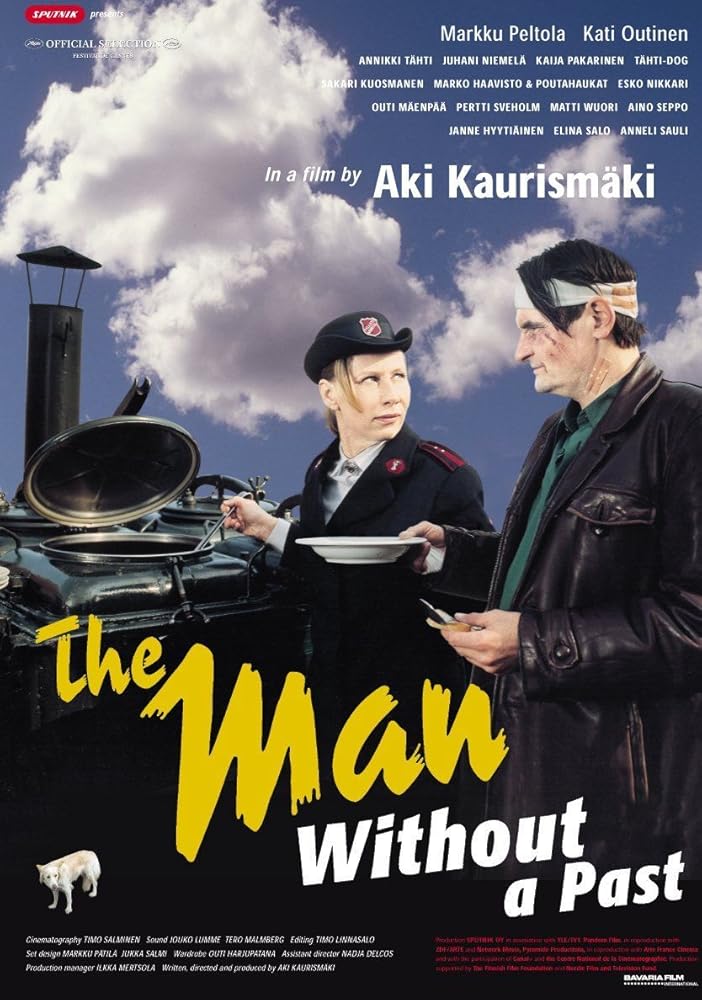
MAN WITHOUT A PAST, THE (Mies vailla menneisyyttä)
(director/writer/producer: Aki Kaurismäki; cinematographer: Timo Salminen; editor: Timo Linnasalo; music: Ken Yokoyama; cast: Markku Peltola (M), Kati Outinen (Irma), Juhani Niemelä (Nieminen), Kaija Pakarinen (Kaisa Nieminen), Sakari Kuosmanen (Anttila), Annikki Tähti (Singer of her 1955 hit “Do You Remember Monrepos?”); Runtime: 97; MPAA Rating: PG-13; Sony Pictures Classics; 2002-Finland, in Finnish with English subtitles)
“Should please those who can live with the droll acting.”
Reviewed by Dennis Schwartz
Finnish director Aki Kaurismäki (“The Match Factory Girl“/”Ariel“) skillfully weaves through his familiar signature deadpan humor a fable of pity and irony about the human condition. It is done under the pretext of a muted romantic comedy scenario, where the characters are so lost yet noble in their suffering that they draw the viewer to sympathize with their plight. The filmmaker shows he’s a lover of cinema, as many sight gags are drawn from an array of international films including the original Mummy. It’s a quirky film that will not suit every one’s taste, but should please those who can live with the droll acting and the Charlie Chaplin ‘silent film’ humor.
The middle-aged M (Markku Peltola) has traveled by night-train to Helsinki in search of work and after arriving he’s conked over the noggin with a baseball bat and robbed by three vicious thugs, and is further beaten and left for dead in a park. He manages to get to the men’s room where he collapses and is taken to the hospital. The next day he awakens from his coma and rises to stumble out of the hospital on his own with his head fully wrapped in bandages and ends up sleeping on the beach, where two kids take him to the home of Kaisa and Nieminen. They are living in poverty in a tin storage container, but share their shelter and nurse him back to health. But he can’t remember anything, including his name. The area is at the end of the train line by the waterfront, an industrial wasteland filled with broken tractor trailers and the homeless, drifters, bums, and families hard pressed to make ends meet. The destitute amnesiac rents a broken-down storage container in the squatters’ camp from the landlord Anttila and gets help from his impoverished neighbors fixing it up. He gets a sofa and jukebox from the dump to make it more accommodating, and unsuccessfully seeks work in the unemployment office. They turn him down because he doesn’t have a name, as he soon finds that no one will hire him without that info. It is only the squatters who accept him as he is, and are not troubled that he is nameless.
For meals M goes to the Salvation Army free soup kitchen and is attracted to the plain-looking blonde who runs it, a lifer in the Army, Irma (Kati Outinen). Irma has all but given up on the joys of life and lives a Spartan life in the Army’s dormitory. Before retiring for the night in her solitary room she enjoys listening on the radio to some Finnish 1960s rock ‘n’ roll version of “Do the Shake.” She takes a liking to the wretched nameless creature and hooks him up with a nominal job with the Army. This gives him enough dough to regain some self-respect. But what really rekindles him, is that he feels very comfortable with Irma and a cautionary romance develops between the always properly behaved virgin and the man who is befuddled by not knowing who he is.
“The Man” plays with the interesting theme of getting another chance to begin life again. M looks upon his new start as a blessing to get things right this time, as he senses that there might have been mistakes in his former life. We gradually see him going from a loner to becoming a part of the community.
The film can best be appreciated when its sly humor is at work without inhibitions, as M in his childlike innocence can’t avoid getting into trouble even when he tries hard not to. Told by a construction company that they can only hire him if he gives them a name or if he can get a numbered Swiss bank account, he tries to conform to their wishes by going to a bank. But a bank robber appears wielding a rifle and takes only the money frozen in his account, and locks M and the female bank manager in the vault. When rescued the police refuse to let the eyewitness go until he provides a name, as they fear he might be a foreigner even though he speaks a fluent Finnish. The scene that was the most fun, had M’s lawyer arguing back and forth with the police authority in legalese, as each side quoted the law until his Salvation Army lawyer must have known more law because he was soon released.
The story itself is not expansive; but, the characters were likable, every mise-en-scène was charmingly executed, and its well-intentioned humanistic meaning that man cannot live without the help of others or without helping others, gives it more of a fairy tale than a reality look. Despite a few contrivances, such as the way it forced everyone either to be a meanie or a nice person and tried at times to be too cutesy, I was totally engrossed throughout and was kind of amused by it all.
REVIEWED ON 10/21/2003 GRADE: B